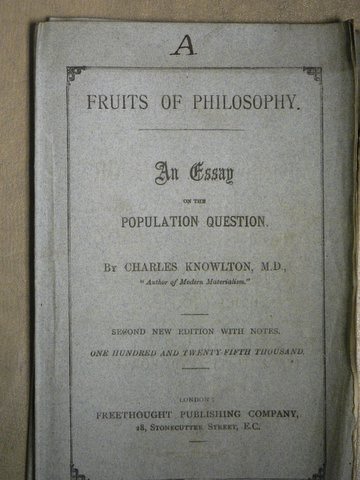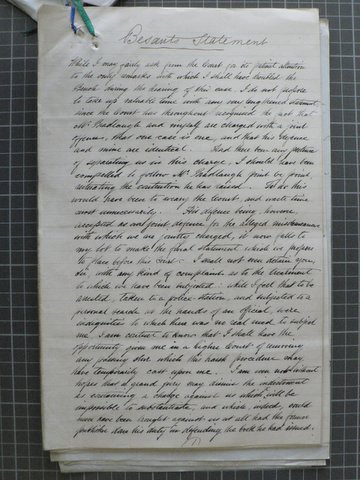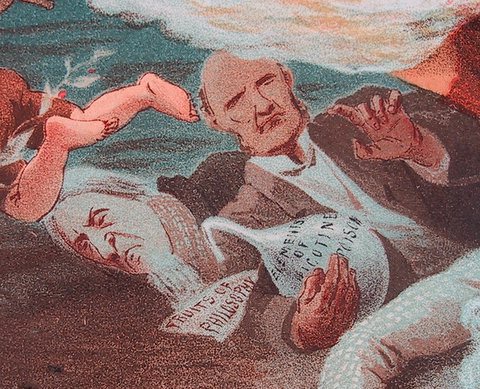Happiness, Progress and the "Vanity of the Philosopher". Part 2. The Trial of Annie Besant and Charles Bradlaugh
By Sandra J. Peart and David M. Levy

1 Introduction
“The dramatic episode that clarified the difference between classical political economy and Darwin’s biology began on June 18, 1877, with the trial of two prominent neo-Malthusians, Charles Bradlaugh and Annie Besant, for the crime of publishing an ‘obscene’ book, a practical guide to contraception by the American physician, John Knowlton, Fruits of Philosophy.“
The popular interpretation of Malthusian population theory is one of inexorable tragedy—population will inevitably outstrip the food supply leading to famine and death. This caricature of Thomas Robert Malthus neglects his view that individuals could make choices to avoid tragedy, using their uniquely human gifts of foresight and calculation.
Even though Malthus was aware of the sexual temptation associated with an unmarried state, Malthus advocated delay of marriage to prudentially restrain population. He recognized the “vice” that would follow from this delay of marriage but chose to risk this and advocated what he called the “preventive check” as a way to avoid misery. An additional step was taken by “neo-Malthusians,” Francis Place, James Mill, and John Stuart Mill, who advocated contraception so that people could marry at a younger age and still prudentially restrain population. J. S. Mill wrote about this delicately in his Principles of Political Economy:
That it is possible to delay marriage, and to live in abstinence while unmarried, most people are willing to allow; but when persons are once married, the idea, in this country, never seems to enter any one’s mind that having or not having a family, or the number of which it shall consist, is amenable to their own control. One would imagine that children were rained down upon married people, direct from heaven, without their being art or part in the matter; that it was really, as the common phrases have it, God’s will, and not their own, which decided the numbers of their offspring—(Principles of Political Economy, Bk. II, Ch. 13, par. II.13.3).
Charles Darwin’s views on population growth stand in contrast with those of Malthus. His theory of natural selection was a theory about creatures without the ability to foresee the consequences of their actions. In such a world, population growth would ultimately be checked not by providential restraint but by the miseries of too many creatures chasing too little food. Darwin believed that natural selection applied to humans, thereby guaranteeing that human beings become “better” over time as the pressures of scarcity winnowed out those who could not compete.
Malthus and the Neo-Malthusians called the natural forces that limited population growth, the “positive check.” They instead advocated what they called the “preventive check”—the deliberate use of contraception or other foresightful behavior to avoid misery. According to Darwin’s theories, adding the preventive check to the positive check was tampering with natural selection—it would impede human progress.
As might be expected, the contrasting positions on foresight and family formation also coincided with contrasting views on making contraceptive information available. Malthus’ population theory was a plea for experts to trust the individual’s own understanding of his place in the world and for experts to stop trying to make decisions for poor people. Equipped with the capacity to foresee the consequences of their actions, poor people—like anyone else—were capable of deciding when to marry and have children. The opposing view was that if poor people didn’t possess the foresight or ability to make such decisions, birth control should be controlled by experts in the medical profession.
The contraceptive method most discussed in the neo-Malthusian pamphlets was the sponge with string attached. Condoms were less emphasized because of their association with prostitution. In the Fruits of Philosophy, Knowlton described a douche that used “a syringe filled with a solution of the astringent alum and infusions of white oak or hemlock bark, green tea, or raspberry leaf.”
These competing positions played out famously in the 1877 trial of Annie Besant and Charles Bradlaugh for publishing a book on contraception (John Knowlton, Fruits of Philosophy, 1877). There, the preventive, birth-reducing, check of Malthus’s recommendation was compared and contrasted with the positive, death-dealing check of natural selection. Charles Darwin was on the side of restricting information to poor people, of keeping information in the hands of medical experts. When asked, Darwin refused to come to the assistance of Charles Bradlaugh and responded with a letter against his case. John Stuart Mill and the neo-Malthusians advocated wide dissemination of birth control information, trusting all individuals (rich and poor) to make decisions.
The question of who should have access to contraceptive information—doctors vs. everyone—surfaced again later in the American “birth-control movement.” The doctrine that people can be trusted to learn from contending specialists, much in evidence in the Bradlaugh-Besant defense, was later abandoned by the American birth-control movement as an impediment to eugenic perfection. Margaret Sanger, the founder of the American Birth Control League that became Planned Parenthood, opposed the widespread dissemination of birth control information on the grounds that the general public was somehow unable to make “correct” reproductive choices without some “help” from their betters.
2 The Trial
Figure 1. Title page of Charles Knowlton’s Fruits of Philosophy
The dramatic episode that clarified the difference between classical political economy and Darwin’s biology began on June 18, 1877, with the trial of two prominent neo-Malthusians, Charles Bradlaugh and Annie Besant, for the crime of publishing an “obscene” book, a practical guide to contraception by the American physician, John Knowlton, Fruits of Philosophy. Besant and Bradlaugh were charged with publishing material that was “calculated to destroy or corrupt the morals of the people” and “calculated to produce a pernicious effect in depraving and debauching the minds of the persons into whose hands it might come” (Fruits of Philosophy, pp. 5, 11-12).
3 What is “Natural” About Natural Selection?
In court, Annie Besant began her defence (which she conducted for herself), by suggesting that she stood before the court “as counsel for hundreds of the poor, and it is they for whom I defend this case” (p. 28). She located her pro-contraception (neo-Malthusian) approach inside the larger body of Malthusian thinking. Since it was uncontroversial that any species, whether human or otherwise, can grow exponentially, some “check” to population was always needed. Besant identified Malthus’s “positive” check—misery and starvation—as being “natural” only to the extent that death and starvation operate on all species without reason and foresight (72-3). Besant continued to develop a profound argument. In humans, “positive checks” are “natural” only when “nature” is understood as unmodified by man’s reason. She then developed the neo-Malthusian counterargument at some length—man’s reason and foresight open the additional opportunity of “preventive checks” (p. 73).
Besant insisted that her case was constructed from Malthus: “I have pleaded that our intent is good, and that the purpose at which we aim is good, because it conduces to human and to social happiness. I have shown you from Malthus…. I have shown that some checks must prevail, either positive or preventive…” (73)
On the second day of the trial, Besant recounted how Darwin identified natural selection applied to humans with Malthus’s “positive check”, famine, starvation and death. She quotes the passage from Darwin in which he denied the possibility of “prudential restraint” among agents subject to natural selection:
in his great work on the “Origin of Species,” p. 61, he remarks that “of the many individuals of any species which are periodically born, but a small number can survive,” and on p. 63, he says: ” A struggle for existence inevitably follows, from the high rate at which all organic beings tend to increase. … Hence, as more individuals are produced than can possibly survive, there must, in every case, be a struggle for existence, either one individual with another of the same species, or with individuals of distinct species, or with the physical conditions of life. It is the doctrine of Malthus applied with manifold force to the whole animal and vegetable kingdoms, for in this case there can be no artificial increase of food, no prudential restraint from marriage. (75-76)
Before the trial had began, Bradlaugh had asked Darwin to attend the trial and testify in his favor. Darwin responded that he in fact opposed their neo-Malthusian views. Instead of the public dissemination of contraceptive information, Darwin responded that he feared the effects of the suspension of the continued struggle for existence and he opposed the defendants’ actions. He informed Bradlaugh that his views on the matter had been made clear in Descent of Man and he pointed Bradlaugh to the precise passage on point. And, he added, if forced to testify at their trial, he would make public his opposition to their views.
The second edition of the trial transcript published by Bradlaugh and Besant’s Freethought Publishing Company, contains the reversal of the guilty verdict because the original indictment did not specify which words in the book were “indecent”, in violation of law. Lord Justice Brett summarized the reason for reversal: “we have an absolute omission of that which was the crime alleged—the words which are relied upon as indecent. … My opinion, therefore, is that this indictment is not framed in accordance with the rule governing such cases, and that neither upon authority nor principle can the omission of the words be excused, and that, therefore, the judgement of the Court below cannot stand”
Darwin needn’t have worried. Annie Besant spelled out his views in some detail. She read from his letter, acknowledged his opposition to the suspension of the law of natural selection that would result from the limitation of family size. She objected to the “awful amount of human misery” that Darwin’s alternative entailed as a “necessary condition for progress”:
Mr. Darwin, writing to us a few days since, pointed our attention to the following extract from his ” Descent of Man,” p. 618: — “The enhancement [sic] of the welfare of mankind is a most intricate problem; all ought to refrain from marriage who cannot avoid abject poverty for their children, for poverty is not only a great evil, but tends to its own increase by leading to recklessness in marriage. On the other hand, as Mr. Galton has remarked, if the prudent avoid marriage, whilst the reckless marry, the inferior members tend to supplant the better members of society. Man, like every other animal, has no doubt advanced to his present high condition through a struggle for existence, consequent on his rapid multiplication, and if he is to advance still higher it is to be feared that he must remain subject to a severe struggle; otherwise he would sink into indolence, and the more gifted men would not be more successful in the battle of life than the less gifted. Hence our natural rate of increase, though leading to many and obvious evils, must not be greatly diminished by any means.” That is Mr. Darwin’s position, and, putting aside for a moment the awful amount of human misery which it accepts as the necessary condition of progress, let us see if the position be defensible. (96)
Thus, Besant’s summary of the letter emphasized the conflict between the “progress” associated with the operation of natural selection in the absence of foresight and contraceptive information, and the “happiness” associated with Mill’s proposal for families to choose the number of children. She distanced herself from Darwin and took her stand instead with Mill:
Take the following passage as a fair sample of John Stuart Mill’s opinion: —” Poverty, like most social evils, exists because men follow their brute instincts without due consideration. But society is possible, precisely because man is not necessarily a brute. Civilisation in every one of its aspects is a struggle against the animal instincts…. (111)
Besant continued to present the passage that follows this in Mill’s Principles, the one we quoted earlier on birth control within marriage.
On the 24th of March, 1877, Besant and Bradlaugh were convicted of “knowingly” and “willfully” printing a “certain indecent, lewd, filthy, and obscene libel, to wit, a certain indecent, lewd, flithy, bawdy, and obscene book, called ‘Fruits of Philosophy,’ thereby contaminating, vitiating, and corrupting the morals as well as of youth.” On a second count, they were convicted 5 days later. In June, they were sentenced to six months in prison, and fined 200 pounds each for their actions. (1877, pp. 322-3)
The public discussion of the Bradlaugh case recognized Mill as the great voice against an imposed hierarchy, either the old hierarchy following from the “natural” link between marriage and children or the coming hierarchy of racial remaking. This recognition may have been responsible for one of the most remarkable caricatures which we have encountered in the Cope’s images reproduced in our Vanity of the Philosopher.
Figure 3. Copes detail
The Times covered the trial in detail. It reported on the case of “The Queen v Bradlaugh and Another,” delicately hiding Annie Besant’s name. The account portrayed the story as a conflict between the neo-Malthusians, as represented by J. S. Mill, and Charles Darwin. It focused on the question of what is more important: undirected sympathetic connections among individuals, vs. assisting the law of Natural Selection to “develop” the race. It began with a lengthy quote of Annie Besant describing Malthusian prescriptions (Times 20 June 1877, p. 11). Two paragraphs later, the Times noticed that Besant appealed to Mill, whose idea of the relation of human development and animal existence was said to differ from Darwin’s:
Mr. Mill having strongly urged the necessity for ‘continence,’ went to observe that from the way in which people commonly talked of offspring as a sort of necessity it might almost be supposed that they allowed themselves to suppose their own volition had nothing to do with it. (Times 20 June 1877, p. 11).
4 Expert Direction In America
The underlying theme of the Bradlaugh-Besant trial was whether
individuals need direction in their family planning choices, or whether we can trust their judgment and foresight to make these choices sensibly. Following the line of argument in Mill’s On Liberty, Annie Besant stressed the importance of free discussion of contraceptive information by ordinary people (50-2). In her statement for the deposition, she revealed how the neo-Malthusians trusted people to make sensible choices once they were equipped with the knowledge to do so:
Medical knowledge, conveyed in long words, wrapped up in a foreign language… may be useful to members of the medical profession, but it is not useful to the people. Medical knowledge is wanted by the people, and ought to be put within their reach. Lack of knowledge concerning their own bodies throws many a young man and woman into the hands of quacks and charlatans who live upon the ignorance of the poor. (5)
Perhaps not surprisingly, a similar theme underscored debates over contraceptive information in America. So, Margaret Sanger came to defend filtering birth control information through experts (Sanger 1936, pp. 414-15). Taking the Darwinian view, she attacked the idea of a “laissez faire” birth control policy, which, from a eugenic point of view, was said to be the ultimate enemy. We need planning directed by experts, Sanger [in The Pivot of Civilization, Margaret Sanger, New York, 1922], tells us to save us from “imbeciles and the morons”:
the destiny and the progress of civilization and of human expression has been hindered and held back by this burden of the imbecile and the moron. While we may admire the patience and the deep human sympathy with which the great specialists in feeble- mindedness have expressed the hope of drying up the sources of this evil or of rendering it harmless, we should not permit sympathy or sentimentality to blind us to the fact that health and vitality and human growth likewise need cultivation. …—a [laissez faire] policy increases and multiplies the dangers of the over-fertile feeble-minded.[p. 5 Public Record Office in Kew, KB6/4 (Trinity 1877). The record finder describes this as “Depositions and preliminary hearings before magistrate. Copy of Fruits of Philosophy.]
For more on the desire of experts to sterilize those deemed to be unfit for procreation, see David Levy and Sandra Peart’s earlier essay on eugenics: The Secret History of the Dismal Science: Eugenics and the Amoralization of Economics.
If, as the classical economists did, one trusts the public, equipped with the knowledge and technology, to make decisions concerning family formation, then there can be no role for the expert except as provider of information to the public. By contrast, if one concludes, as Sanger did, that the lower strata might not avail themselves as they “should” to contraceptive means, the door opens for a so-called “expert” to make recommendations concerning reproduction among this group. So-equipped with this moral high ground, the “expert” might discern that there are some among us who simply should not be allowed to procreate, who should be sterilized.
Today, even among those who do not approve of contraception we find no political movement to ban its discussion, so that issue is no longer controversial. Nonetheless, the debate still with us in philosophical terms: do we trust people to make decisions for themselves or do we believe that people require expert direction?
Their new book, The Vanity of the Philosopher, is available through Amazon and other sources.For more articles by Sandra J. Peart and David M. Levy, see the Archive.



